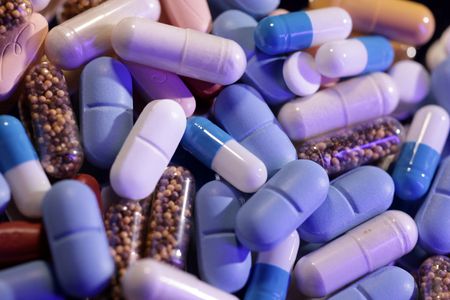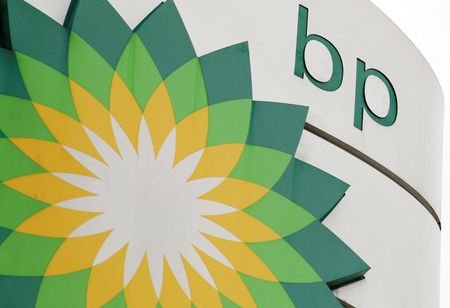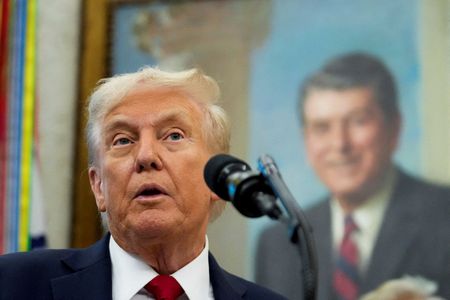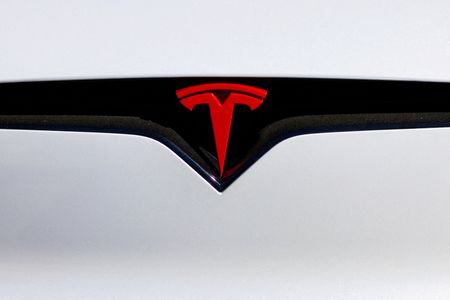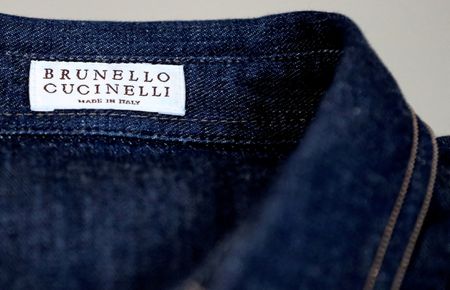By Patrick Wingrove, Michael Erman and Maggie Fick
NEW YORK/LONDON (Reuters) -U.S. President Donald Trump’s threat to impose 100% tariffs on branded drugs ratcheted up pressure on pharmaceutical companies to agree price cuts and shift manufacturing after talks faltered earlier this year, industry lobbyists and executives said.
The squeeze produced what Trump is touting as the first big move – Pfizer on Tuesday agreed to slash drug prices in Medicaid for low-income people and for new drugs in exchange for relief on tariffs, setting a bar lobbyists say rivals may be forced to match or beat.
Pfizer CEO Albert Bourla said he would invest $70 billion in the United States, including in repatriating the manufacturing of medicines sold in the country. The deal boosted Pfizer’s shares and those of U.S. and European rivals on hopes of similar agreements.
Trump, who said more deals with drugmakers would be announced in the coming weeks, in July had set a September 29 deadline for 17 top drug companies to agree to cut prices.
STALLED TALKS WERE FOLLOWED BY MORE TARIFFS
With talks stalled, Trump last week announced a 100% tariff on branded-drug imports starting October 1, exempting firms already building U.S. plants and surprising an industry that had been expecting more lenient treatment.
One pharmaceutical industry lobbyist, who asked for anonymity, said Trump appeared to have lost patience with the political process, citing the U.S. government shutdown and his urgency to push through his agenda.
A U.S. government shutdown began Wednesday after Congress and the White House failed to reach a funding deal.
A White House official said that Trump was “wholeheartedly committed to lowering drug prices for Americans and will not hesitate to utilize tariffs to do so.” The official said the Commerce Department would start preparing tariffs on October 1 for companies that do not move manufacturing or cut prices.
The tariff threat was perceived by the pharmaceutical industry as an attempt to drive drugmakers to offer more substantive price cuts, with Trump hoping to force them down by 30% to 80%. He has also been heaping pressure on drugmakers to invest more in U.S. manufacturing.
Centers for Medicare and Medicaid Services Administrator Mehmet Oz said during a press conference that the government’s breakthrough with Pfizer occurred last week. Pfizer, a U.S. firm, has manufacturing sites around Europe.
LOOKING FOR QUICK CONCESSIONS
The White House is seeking quick, headline-ready concessions, but the U.S. system isn’t built for such rapid, substantive cuts without other changes like reforming the role of pharmacy middlemen and hospital drug pricing, one pharmaceuticals executive said.
That’s not going to happen overnight, the executive said. “It’s real and significant work and involves structural changes that are required in the U.S. healthcare system.”
Unlike most other countries, the U.S. has a private healthcare system that does not buy medicines and negotiate prices for its citizens. Studies have shown that the U.S. pays often nearly three times as much as other wealthy nations.
A second pharmaceutical executive said the impact of Pfizer’s deal was not clear and that he needed more information, particularly on the company-specific tariffs exemption offered.
Several drugmakers, including Johnson & Johnson, Roche and Sanofi, have pledged to pump hundreds of billions of dollars into U.S. manufacturing in the coming years, giving Trump a political win. Still, some of these commitments may have been happening anyway.
DIRECT TO CONSUMER PRICING
Others have also set up direct-to-consumer pricing for some of their drugs, to be listed on a new website from U.S. lobby group PhRMA, and raised medicine prices in Britain in line with Trump’s desire to offset price decreases in the United States.
Bristol Myers and Pfizer announced in July that they would start selling their blockbuster blood thinner Eliquis directly to patients. The program, targeted at the small percentage of uninsured or under-insured Eliquis patients, offers a 43% discount to the list price, which is more than nine times the average out-of-pocket cost paid by commercially insured patients. AstraZeneca last week announced a similar program for its diabetes and asthma drugs.
Peter Kolchinsky, managing partner at RA Capital Management, said the U.S. administration’s push to get lower prices domestically and to force other countries to pay more, could end up causing U.S. prices to rise if fewer countries buy the drugs.
“Forcing companies to charge the same net price everywhere would backfire on Americans,” he said.
(Reporting by Patrick Wingrove and Michael Erman in New York and Maggie Fick in London. Editing by Caroline Humer and Mark Potter)

